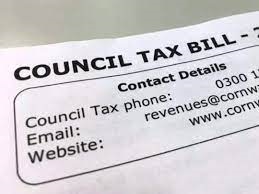Council Tax is a type of tax in England, Scotland, and Wales. It is a tax on residential property that was put in place in 1993 by the Local Government Finance Act 1992, taking the place of the short-lived Community Charge and the domestic rates. Except for properties valued above £320,000, the higher the tax, the more valuable the property (in 1991 prices). Some property is exempt from taxation, and some people are exempt from paying tax while others receive a discount.
How much Council Tax you pay depends on:
- Your personal situation
- the valuation band in which your property falls;
- the amount required by the council to fund its services.
What does council tax pay for?
Local services are funded by Council Tax. This includes:
Police and fire departments
- Leisure and recreation projects, such as the maintenance of parks and sports facilities
- Educational services and libraries
- Collection and disposal of waste and garbage
- Transportation and highway services, such as street lighting and cleaning, as well as road maintenance services
- Environmental and commercial standards
- Marriages, deaths, and births, as well as local elections, require administration and record-keeping.
- Council Tax is not used to fund health-care services.
How Council Tax bill is calculated?
How much you pay in council tax depends on several factors:
- Your home’s council tax band
- How much money your local council needs to raise
- Your personal circumstances
- In England, there are eight different council tax bands, ranging from A (the cheapest properties) to H (the costliest)
- Wales has equivalent price ranges but a ninth band. There are eight distinct bands in Scotland.
- The council tax assumes that each property has two or more adults living in it.
You may be eligible for a council tax discount depending on your living situation, income, and health.
How to know your tax band?
GOV.UK allows you to check the council tax band of any estate in England and Wales. Simply enter your postcode and the council tax band will be displayed. If you are in England, you can also contact the Valuation Office Agency (VOA) at 03000 501 501. Call 03000 505 505 if your estate is in Wales.

If the property is in Scotland, consult the Scottish Assessors website.
This is also a good way to ensure that you are paying the proper council tax for your property. You can utilize it to challenge a council tax band calculation, such as if you believe you have been placed in the incorrect council tax band.
Council tax bands for England
| COUNCIL TAX BAND (ENGLAND) | VALUATION |
| A | Up to £40,000 |
| B | £40,001 – £52,000 |
| C | £52,001 – £68,000 |
| D | £68,001 – £88,000 |
| E | £88,001 – £120,000 |
| F | £120,001 – £160,000 |
| G | £160,001 – £320,000 |
| H | £320,001 + |
Council tax bands for Wales
| COUNCIL TAX BAND (WALES) | VALUATION |
| A | Up to £44,000 |
| B | £44,001 – £65,000 |
| C | £65,001 – £91,000 |
| D | £91,001 – £123,000 |
| E | £123,001 – £162,000 |
| F | £162,001 – £223,000 |
| G | £223,001 – £324,000 |
| H | £324,001 – £424,000 |
| I | £424,000 + |
Council tax bands for Scotland
| COUNCIL TAX BAND (SCOTLAND) | VALUATION |
| A | Up to £27,000 |
| B | £27,001 – £35,000 |
| C | £35,001 – £45,000 |
| D | £45,001 – £58,000 |
| E | £58,001 – £80,000 |
| F | £80,001 – £106,000 |
| G | £106,001 – £212,000 |
| H | £212,001 + |
How to get reduction on Council tax?
You might be able to get a reduction on your Council Tax if you’re:
- On a limited income.
- You are a student or live with students.
- You reside alone or are the sole adult in your household.
- Apply for benefits like Jobseekers Allowance, Income Support, Pension Credit, Employment and Support Allowance, and Universal Credit.
- Or perhaps someone you reside with has an impairment and requires a larger home.
- Severe mental illness or living with someone who is.
- A care leaver in Scotland, where you will be excluded from Council Tax from the age of 18 to the age of 26.
- A care leaver living in certain provinces in England or Wales.
- Military personnel, depending on your situation.
- Placed in a nursing home or hospital.
- In prison – unless you’re sentenced to prison for failing to pay Council Tax.
Council Tax exemption
The following homes and properties are free from council tax, where:
- The inhabitants are all minors under the age of 18.
- The only residents have dementia or other forms of severe mental impairment.
- All residents participate in the official British Council programme as full-time students or Foreign Language Assistants.
On vacant property, you typically have to pay council tax.
In England, your council tax may increase by up to twice as much if you keep a house empty and unfurnished for more than two years. If your home has been unoccupied for ten years or longer, this can increase to four times your typical bill.
However, some vacant properties will be free from council taxes. For instance, because:
- For instance, because:
- The occupant is in jail for offences unrelated to failure to pay council taxes.
- The mortgage lender has seized the property.
- It has been compulsorily acquired before deconstruction, is neglected, or has been damaged.
- The property is a new construction and is not yet suited for habitation. When council tax on a new build becomes due, the council will issue a completion notice with a date of completion.
